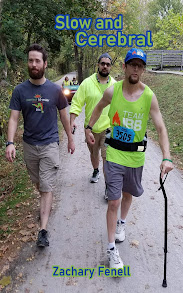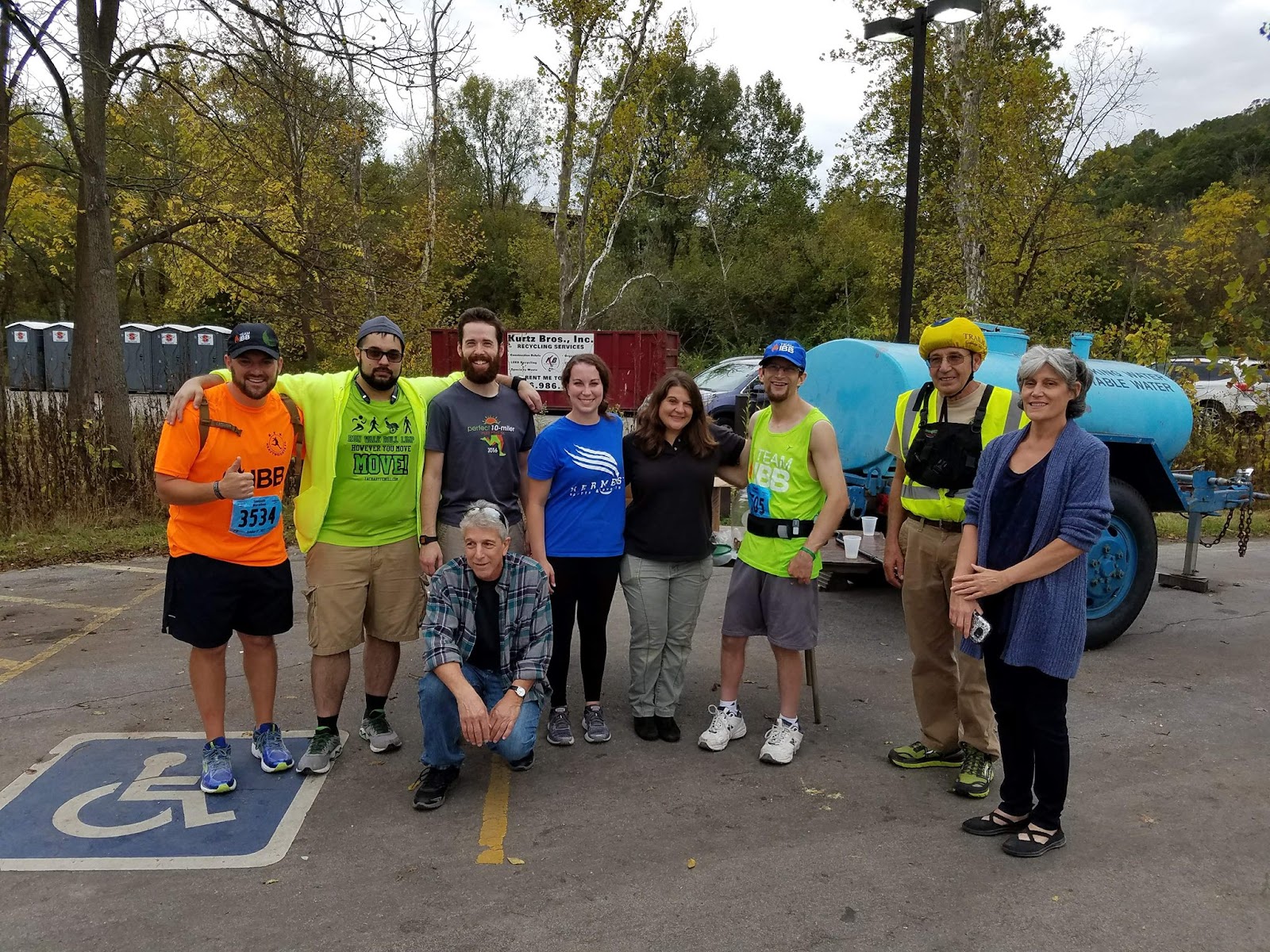A lot has happened since my last guest post, published nearly a decade ago. Nearly a decade? Wow! Where the heck does the time go? Anyway, amongst those prior mentioned happenings, one in-particular stands out to me. I accomplished a feat that nearly a decade ago I deemed “unreasonable.” Becoming a marathoner.
Walking 26.2 miles to complete a marathon seemed unreasonable to me because I have cerebral palsy (CP). The neurological disability causes me to walk with an awkward gait, battle balance issues, fatigue faster, and much more. Nonetheless, I eventually found myself training for a marathon. Throughout the journey, I learned the following lessons about inclusion.
 |
| Zachary Fenell's Book |
Inclusion Lesson #1: We can get in our own way.
Before anyone places barriers towards inclusion in our way, we can get in our own way. Psyching ourselves out by imagining negative situations. For example, prior to my first ever 5K (3.1 miles), I had concerns. Due to CP, my fine motor skills lack some fineness. I imagined the scene playing out in my head.
While struggling to pin my BIB number to my shirt, a staff member with Lake View Cemetery’s Run Through History would spot me. Marching over he would snatch the BIB from me, declaring, “This is not for you!” Instead, regulating me to participate in the shorter, untimed one mile portion of the event.
To emphasize, I imagined the above scenario. Nevertheless, the anxiety created through the imagined scene risked becoming real. Casting internal doubt, “Do I really belong?”
Gone unchecked, these thoughts become barriers to inclusion. Convincing ourselves to maybe not participate after all. Learning to spot these self-sabotaging thoughts remains vital towards knocking down these self-set barriers. Once spotted, you and I can determine how to best counter the doubts.
To go back to my 5K example, I stopped and took a deep breath. Then I reminded myself of wisdom I encountered reading the audiobook Living This Rodeo by Shane Michael Taylor. In the book he points out how our imaginations cause us real anxieties. Highlighting the ridiculousness of letting something imaginary cause us real grief. Acknowledging said silliness gave me the peace of mind to move forward anyway. Paving the path to my next inclusion lesson.
Inclusion Lesson #2: People probably want to support you.
Crossing the finish line of the 2015 Run Through History 5K remained an emotional moment. Volunteers and race staff supplied an upbeat outlook. Praising me as “inspirational.” Meanwhile I felt quite different. Grappling with disappointment and frustration over finishing dead last. Again, getting in my own way. Preventing myself from enjoying my accomplishment.
Or at least initially. In time I learned to accept the praise. Realizing I deserve credit for just being out there and finishing. Reassurance I chose the right mindset arrived a few weeks later when Lake View Cemetery sent me a handwritten thank you card. Once more touting me as, “an inspiration” and deeming me “deserving of a medal.”
These supportive words left a resounding impact on me. Encouraging comments in the moment remains one thing. To sit down afterwards to echo the sentiments showed a truly welcoming attitude. Leaving me feeling valued and included.
Motivated by my overall positive experience at the Run Through History, I kept pursuing my larger marathon goal. Along the way others continued to step up to support me. All the support culminating Sunday, October 9th, 2017, at the Towpath Marathon.
Going into the day I aimed to finish the 26.2-mile course in eight-and-a-half hours. The goal time would have me crossing the finish line around 2pm when Canalway Partners’ (the race organizers) permit for Cuyahoga Valley National Park expired and the park opened back to the public. Fast forward to 2pm and I found myself still far from the finish line.
Rather than abandoning me and saying, “Oh well,” a small team comprised of Canalway Partners and Cuyahoga Valley National Park staff stayed and rallied behind me. Even somebody from the contracted timing services company stayed to ensure I would receive an official finish time. Upon finally crossing the finish line at 11 hours, 40 minutes, and 31 seconds celebratory vibes resonated from everyone. Nobody seemed upset I had everyone waiting around for three hours. Instead, everybody looked to get a picture with me. An amazing atmosphere made possible thanks to the third inclusion lesson my marathon journey taught me.
Inclusion Lesson #3: Ask how, not what.
Too often we find ourselves focusing on the what. Quickly becoming intimidated and overwhelmed by the mission at hand. The first time the idea to walk a marathon came to me, I promptly dismissed the goal. Deeming completing 26.2 miles with CP an “unreasonable” feat.
However, once I shifted my mindset from what to how everything became a little more attainable. No longer did I view my cerebral palsy diagnosis as a singular force limiting me. Instead, I looked at the challenges caused by my CP as individual obstacles.
Like I mentioned earlier in this post, thanks to CP I battle balance issues and fatigue faster. Challenges I addressed through asking myself “How could I neutralize this issue?” Neutralizing my balance issues meant using my cane for extra support. Counteracting fatigue entailed making changes to my diet to boost my energy levels.
Sometimes though, answering how requires cooperation. For instance, I could have used timeframe as a reason I could not complete a marathon. Traditionally Canalway Partners offers a seven-hour window for participants to complete the Towpath Marathon. Even at my ambitious eight-and-a-half-hour goal finish time, the math would not work.
Therefore, I decided to reach out to Canalway Partners and ask permission to start earlier. To show a precedent exists, I shared with them an article about someone with CP who received an early start so she could complete a half marathon. Further reinforcing inclusion lesson two, Canalway Partners worked with the park rangers at Cuyahoga Valley National Park and my proposed early start received the green light.
Learn more.
The stories I shared today about my marathon journey are only a handful of many. They demonstrate three inclusion lessons I learned along the way. First, we can get in our own way, Second, people probably want to support you. Third, ask how, not what.
For an in-depth look into my marathon journey, checkout my new memoir Slow and Cerebral. Not only will the read reinforce today’s post, but you will likely develop another takeaway or two yourself.
As I always like to say to end my posts, don’t blend in. Blend out!
-Zachary
Zachary Fenell is an author, blogger, and overall cerebral palsy (CP) advocate. He is a co-founder and current co-host of the weekly cerebral palsy Twitter chat #CPChatNow. For more about Zachary's advocacy efforts and find where to connect with him, visit zacharyfenell.com




I really enjoyed this post. I think that these universal lessons are incredibly imperative when working to reach our students, and ensuring they know they can do it with the supports that we can offer them. Helping alleviate some of the anxieties that often come from school. Lesson #2 really reasonated with me, where I want my students to know that I will support them, and they should be proud of all the work they're doing. Helping them shift into a more positive mindset can also give them a more positive outlook on school! Thank you for posting this. It was great to see things from your perspective!
ReplyDelete